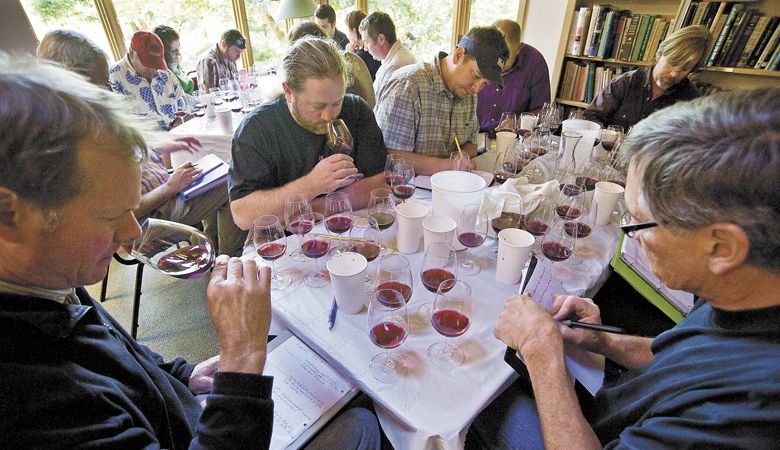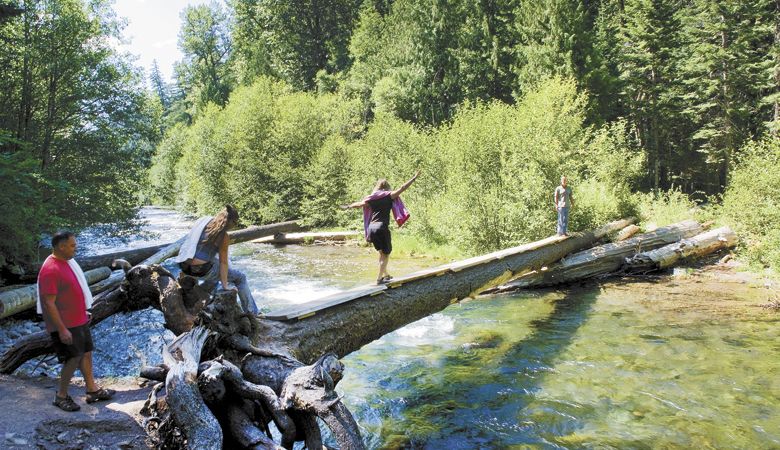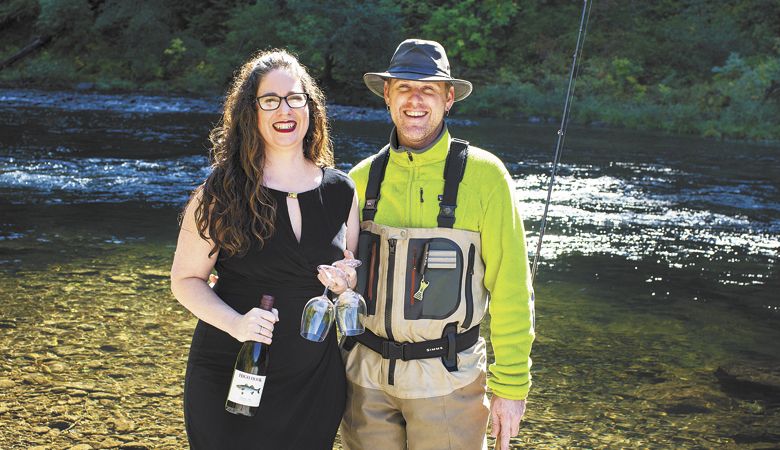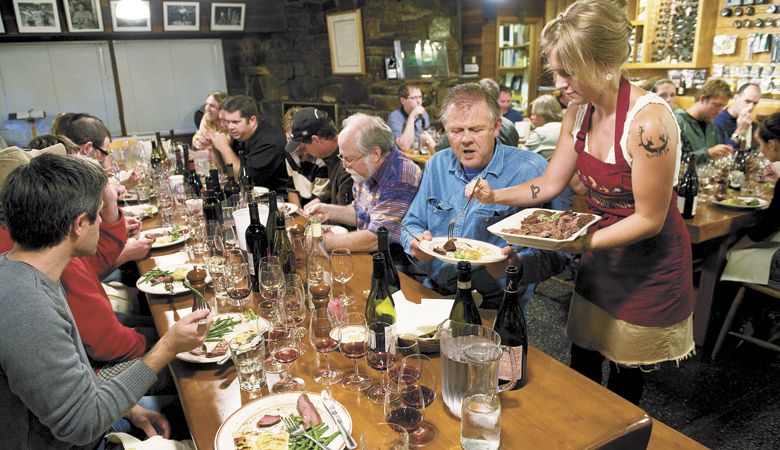Fishing for Pinot Perfection
Steamboat Inn vital to Oregon wine evolution
Perched on a bluff overlooking the rushing waters of the Umpqua River, a small, quaint inn has been serving grateful guests since 1957. When it first opened as a fishing camp, it would have been hard to imagine its transformation into an essential ingredient in the Oregon Pinot Noir story and the home to one of the best-kept wine secrets in the state.
But first, a little history.
Initially founded as Clarence Gordon’s North Umpqua Lodge, the site served the North Umpqua fishing community from the early 1930s until 1954, when it relocated across the river to the present site where the main building was erected. The original lodge is actually now the Steamboat Inn’s Campwater Houses.
In 1957, Frank and Jeanne Moore purchased the business from Gordon and turned it into the Steamboat Inn. Frank built the cabins, Jeanne cooked for the construction crews building the North Umpqua Highway, and guests helped with cooking and serving. The name actually originates from the early days when gold was mined — not very successfully — in the area. When mines have been depleted or when prospects don’t meet expectations, either naturally or through fraud, miners would say they’ve been “steamboated.”
The Moores managed the inn until 1975, when it was purchased by Jim and Sharon Van Loan; Patricia Lee joined them in 1978. They expanded the facility, building the Hideaway Cottages, library and suites, and soon afterward, began hosting the annual Pinot Noir Conference, changing the legacy of the inn and overall winemaking in Oregon.
Per Linfield University, Eugene chef Del Pearl, Sunriver sommelier Rick Denton, California winemaker Jim Olsen and Yamhill Valley Vineyards winemaker Stephen Cary conceived the idea for the gathering and sharing of knowledge in the fall of 1979. The Pinot Conference was then further expanded and guided by Cary’s vision with the help of Michael Richmond and Larry Brooks of Acacia Winery, and Myron Redford of Amity Vineyards.
Though records show the Pinot Noir Conference officially started in 1979, according to Brooks, it had been taking place unofficially for several years prior inside Richmond’s California backyard.
“Once it moved to Steamboat, it really evolved,” Brooks said. “People knew that Oregon was going to be important for Pinot Noir. There was the feeling that California’s technical chops could meld with Oregon’s climate and soil potential.”
Originally, the annual conference was meant to alternate between Oregon and California, but the genius of the Steamboat location was that it wasn’t in wine country, so none of the locals could return to their homes at night, requiring some serious socializing.
The conference ultimately became a sacred space for Pinot Noir winemakers from around the world — places like France, Germany, New Zealand — to gather and discuss their craft without worrying what outsiders would say.
“You could go there and let your hair down to discuss nuances of technique that wouldn’t be discussed with the press or general public,” Brooks said. The private group created an opportunity for makers and growers to commiserate with their peers in an unguarded space to discuss any concerns without fear of judgement or misunderstanding. The goal was to simply increase the quality of Pinot Noir through a blind, technical tasting, truly dissecting the entire production process.
In the early days, many Oregon wine entrepreneurs did not necessarily have a great deal of technical experience. The conference transmitted basic information about how to make wine in a consistent and replicable fashion. “The middle years were probably the most productive,” Brooks said. “California had a deeper wine culture, different from Oregon at that time, and sharing that tribal knowledge really helped level the playing field.”
Thomas Houseman, former winemaker of Anne Amie Vineyards, first attended in 2005, while he was the assistant winemaker at Ponzi Vineyards. He recalls, “Larry Brooks became my mentor and guided my winemaking career. The event was about these deep friendships you made and the information you got. You just couldn’t get that information anywhere else; it wasn’t stuff you could learn in a book.”
Over two days, winemakers gathered in a room critically tasting wines in a closed discussion. “It allowed us to be open and vulnerable in ways we couldn’t be with the public or media,” Houseman said. “We sometimes tasted hideous wines that would have never been tasted publicly.”
The candid discussion afforded winemakers the opportunity to learn from one another, picking up tips and tricks along the way. They learned how to make good wines in troublesome years, when rain fell in the middle of harvest, diluting and splitting the grapes. They also discussed smoke taint and climate change, a hot topic these days.
According to Brooks, there was a certain magic about the Steamboat location. Time was always set aside to explore the area, whether fly-fishing, hiking throughout the extensive trail systems, visiting the area’s many waterfalls and hot springs, making a day trip to nearby Crater Lake, or unwinding on the balcony overlooking the Umpqua River.
And, of course, there was the food.
“Pat Lee, the unofficial matriarch and in charge of the kitchen, would put together these extravagant dinner menus and extraordinary affairs around the wines,” Brooks recalled. “In the evening, everyone brought wines from their personal cellars, and bacchanals would ensue late into the night.”
Despite the wine theme and long evenings, the event was family-friendly, with many children in attendance, some of whom would become second-generation winemakers of their family’s labels — like the Ponzis and Etzels. “Myron Redford would take the kids to the Steamboat Creek where they would catch crawdads that we then served for appetizers,” Lee recalled.
Lee is well remembered for building extensive menus centered on the wines. She focused on what was local and fresh, long before it was trendy. She always remembered names and faces, and those who know her, know her kind and genuine hospitality. Lee says the tagline for the inn was, “You’re a stranger here but once” and says it’s the river that brings everyone together — some might argue it was her cooking that did the trick.
Besides the influence on Oregon winemakers, the Pinot Conference had a far-reaching and unpredicted lasting effect. It was the first of its kind, in terms of format, and has since been emulated endlessly, spawning similar symposia like the World of Pinot Noir in California and Southern Pinot Noir Conference in New Zealand, even expanding to other wines like Chardonnay and sparkling wine.
“Together, we built an Oregon icon, and it’s been humbling over the years to be recognized for that,” Lee said, “not only for the hospitality we provided, but for the Oregon wine we helped elevate.”
The conference continued until 2019, and though the fires and the pandemic put the gathering on hold, the current proprietors, Melinda and Travis Woodward, who purchased Steamboat Inn in 2017, believe they will resume in 2022. The Woodwards are enthusiastic about furthering many of the inn’s traditions and celebrating the unique local culture and beauty of the area.
In 2020, the Steamboat Inn was open in June, July and August, after closing during the beginning of the year for COVID-19 restrictions. On Labor Day, the Archie Creek Fire started downriver from Steamboat. The resort was without water, phones or a septic system for five months while repairs were made to the valve house and other damaged infrastructure. Thankfully, the lodge buildings were unscathed, and while some nearby recreation areas are still closed due to fire damage, much of the trail system and nearby waterfalls are accessible. The Hideaway Cottages are requiring slightly more repair and will open this month.
Steamboat Inn offers 18 rooms and can host up to 58 people. Packed with seasonal ingredients sourced from their property and throughout the Pacific Northwest, the lodge’s restaurant prepares fresh, hand-crafted fare infused with traditions from the property’s 60-year history. Breakfast and lunch feature hearty and traditional dishes such as scratch-made biscuits and gravy, house-brined corned beef hash and “Grandma’s Bread’’ made fresh daily. Coffee for the restaurant, rooms and espresso program is sourced from local Takelma Roasting, owned and operated by the Cow Creek Band of Umpqua Tribe of Indians in Roseburg. Adventurous guests out and about for the day can also order a picnic lunch to go.
The Steamboat Inn is located at 42705 North Umpqua Highway, Idleyld Park, 38 miles east of Roseburg and approximately two hours from Eugene, Bend and Medford. Connect with them and discover trip inspiration by following on Instagram and Facebook. For reservations, visit www.thesteamboatinn.com.














